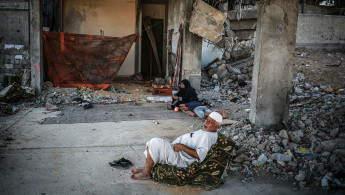The war on Gaza - one year on
Palestinians marked one year since last summer's war in Gaza on Wednesday, with a UN official calling for an end to the "inexcusable" blockade of the territory that has helped prevent rebuilding.
In the course of the conflict - the longest, deadliest and most destructive - 2,251 Palestinians were killed, including 551 children. More than 10,000 were wounded and 100,000 were left homeless.
On the Israeli side 73 people were killed, of whom 67 were soldiers. Up to 1,600 were wounded, according to the United Nations.
The 50-day war
In June 2014, Israeli accused Palestinians of abducting three young Israelis near a Jewish settlement in the occupied West Bank. The kidnapping sparked a massive manhunt in which hundreds of Palestinians were arrested and at least five killed.
The teens' bodies were discovered near Hebron 18 days later. The triple killing then led to the grisly murder of 16-year-old Palestinian Mohammed Abu Khder, who was snatched in occupied east Jerusalem and burned alive by Israelis last July.
This, and Israel's arrest of senior West Bank Hamas officials, triggered rocket fire from Gaza, where Hamas is the de facto power.
On July 8 Israel launched "Operation Protective Edge", with airstrikes on what it said were "approximately 50" Gaza targets and the stated objectives of halting the rocket fire and destroying attack tunnels into Israel.
Israel began a ground offensive on July 17. It withdrew its troops on August 5, saying that all the 'militant tunnels' so far located had been destroyed but there were still "many other missions to complete".
Air and naval bombardments on the coastal strip continued until an Egyptian-brokered truce was reached in Cairo on August 26.
War crimes
Several rights groups accuse Israel of indiscriminate force against civilians and residential buildings, including UN facilities.
The Palestinians have signed up to the International Criminal Court to pursue charges against Israel, and last month submitted a first dossier of evidence.
On June 22 a United Nations commission of inquiry announced it had received "credible allegations" that Israel has committed war crimes.
Several rights groups had accused Israel of using indiscriminate force against civilians and residential buildings, including UN facilities.
Israeli siege
In the summer of 2006, Israel imposed a siege on Gaza. The eight-year siege has created a man-made humanitarian crisis, devastating the economy and severely impacting the wellbeing of civilians.
"The blockade remains in place and its crippling effect on Gaza is undeniable, inexcusable," Robert Turner, operations director in Gaza for UN relief agency UNRWA, told reporters.
The siege, as well as a lack of financing from international donors, have been blamed for the slow pace of reconstruction in Gaza, where around 18,000 homes were destroyed or severely damaged.
A split between Hamas and the Palestinian Authority led by president Mahmoud Abbas, which runs the Israeli-occupied West Bank, has worsened the situation and reconciliation attempts have failed to heal the rift.
Mohammed Zaza, a 19-year-old nursing student, pointed to a vacant lot where his family's house once stood and said they now live in an overpriced, rented flat.
"All that comes out of our pocket because we are receiving absolutely no help," he said.
The UN's Turner said payments would be issued for the first time Wednesday for a limited number of families whose homes were destroyed, while repairs for damaged houses have occurred.
Financing however remains lacking. "We need to help rebuild over 7,000 refugee family homes," he said of his agency's programme. "We have funding only currently for 200 homes."
Poverty
Situated on the Mediterranean coast, flanking Israel and Egypt, the Gaza Strip is home to 1.8 million Palestinians who live in an area stretching just 362 square kilometres (140 square miles), making it one of the most densely populated territories on the planet.
The Gaza Strip has almost no industry, with exports banned under the Israeli blockade.
On the eve of the latest assault on Gaza, unemployment stood at 34.5 percent, one of the highest in the world.
At least 57 percent of households were food insecure and approximately 80 percent of the population was dependent on international assistance and humanitarian aid.
The situation of the public health and education sectors in Gaza was bleak before Operation Protective Edge, with overburdened health facilities, regular electricity outages and insufficient supplies of essential medication, Defense for Children Palestine explained.
What has changed?
Although both sides speak confidently of their preparedness for a new confrontation, "neither Israel nor Hamas wants a new war now," Gazan political scientist Mukhaimer Abu Saada says.
There have been indirect talks with a view to a long-term Gaza truce in exchange for Israel lifting or easing its blockade on the territory.
In previous indirect truce negotiations the Palestinians demanded construction of a Gaza seaport, reconstruction of the coastal enclave's bombed-out airport and an end to the blockade.
They failed to achieve those aims, which were to have been raised at further talks in the wake of the war.





 Follow the Middle East's top stories in English at The New Arab on Google News
Follow the Middle East's top stories in English at The New Arab on Google News
![Israeli forces ordered bombed Gaza's Jabalia, ordering residents to leave [Getty]](/sites/default/files/styles/image_330x185/public/2176418030.jpeg?h=a5f2f23a&itok=_YGZaP1z)

